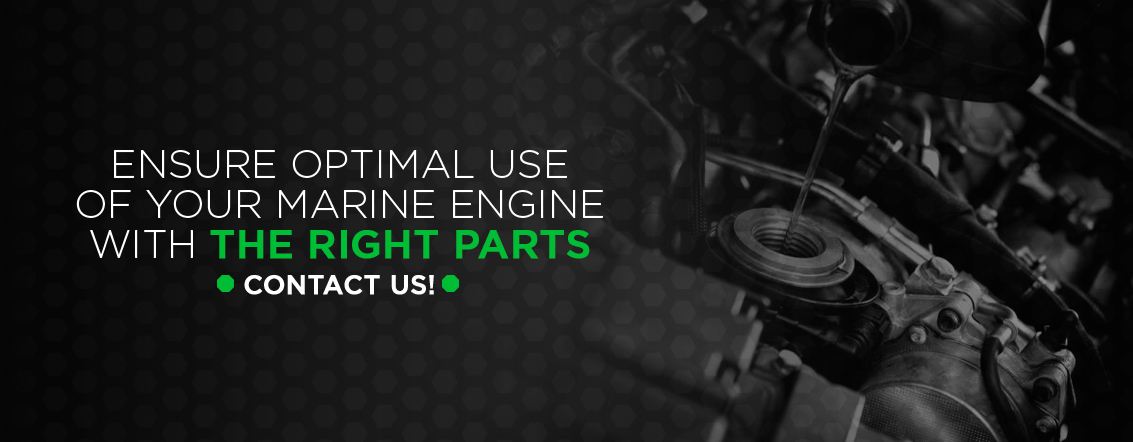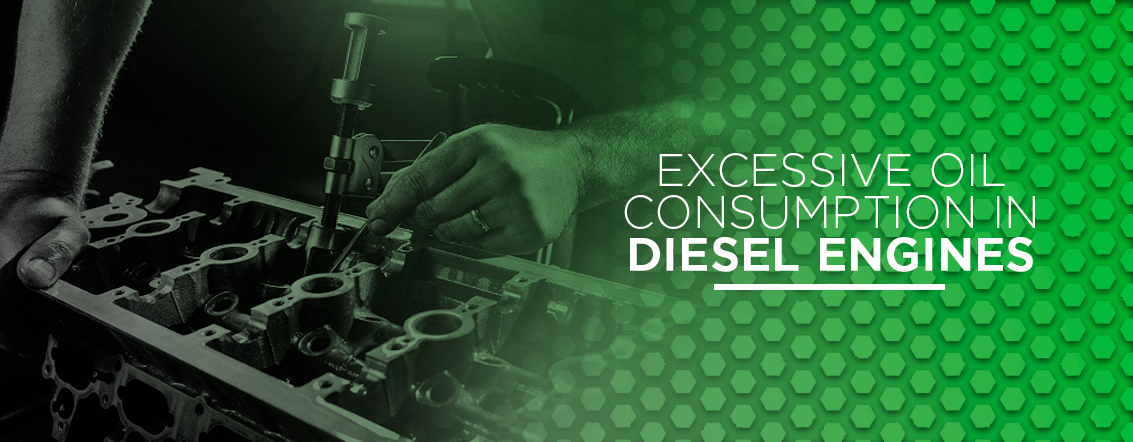
How much oil consumption is normal for a marine engine depends on many factors, such as the engine model, environment, type of boat, hours, load and application. The best thing you can do is refer to your manufacturer’s manual. When your diesel engine begins to consume more than what’s normal, you’ll want to act fast to keep your commercial engine at optimal operating levels.
Diesel Pro Power will take you through what causes excessive engine oil consumption and the impact it has on your operations. The more insight you have, the better you’ll be able to combat the internal issues.
What Is Considered Excessive Oil Consumption?
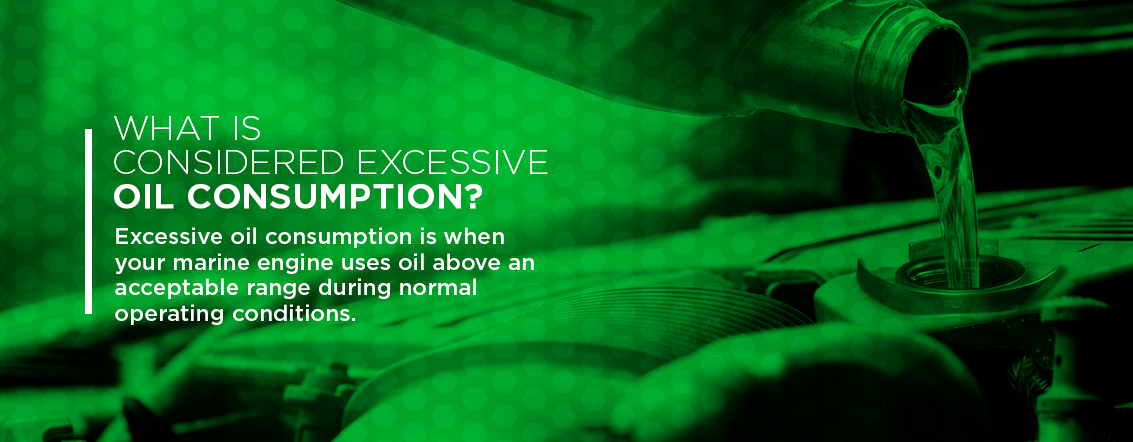
Excessive oil consumption is when your commercial marine engine uses oil above an acceptable range during normal operating conditions. Oil plays a critical role in the performance of any engine because the fluid lubricates the components to enable a smooth process.
Each engine has a natural level of consumption, but when it starts using too much oil, it means there is an issue with its operating conditions or design. Too much oil can impair your engine and other parts of your marine operation. For example, high consumption often occurs in the combustion chamber, valves or piston rings. Although disproportionate use is different from a typical oil leak, internal leaks are usually the main cause that can also lead to burning fluid.
If your diesel engine is draining more oil than necessary, it’s important to understand the various indications. If you find yourself adding more oil more frequently, that’s a solid hint. Other ways to tell are a puff of smoke coming out of the exhaust when you turn the ignition and the smell of burnt oil.
Four Factors That Contribute to High Oil Consumption
Some factors that affect the average oil consumption in a Detriot Diesel, Cummins or another marine engine don’t always relate to internal problems. Instead, certain elements are often in your control. The following are four reasons for excessive oil consumption in diesel engines:
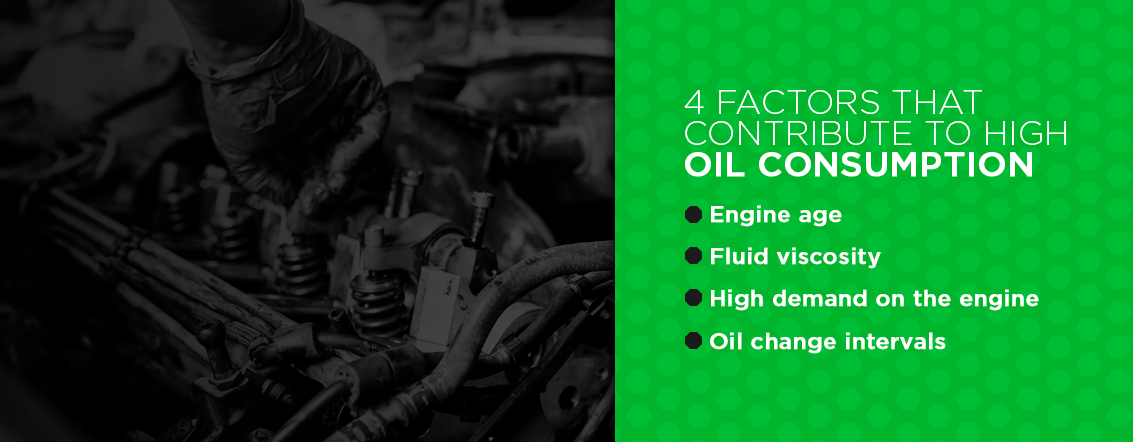
1. Engine age: Every engine goes through changes in oil consumption levels during its lifespan. For example, your diesel engine will go through a break-in period, in which it will consume more oil. Then, it will use a reasonable amount of fluid for an extended time until the engine’s life begins to wind down. Toward the end of the engine’s lifecycle, it will again consume more oil as it experiences more wear than before. If your commercial engine is past its life expectancy, invest in a new one to help increase your boat’s oil efficiency.
2. Fluid viscosity: The thickness of your oil also affects consumption rates. An engine will consume a thinner fluid in higher amounts compared to a more viscous oil. Fluid viscosity is a simple fix — choose a lubricator that matches the model’s viscosity requirements. Some lubricants can have up to 50 percent greater loss in volatility compared to other versions.
3. High demand on the engine: The harder you push your marine engine, the more oil it will consume. For example, placing extreme loads on a fishing boat in rough water conditions will cause stress loading on the pistons. The strain will lead to overconsumption, so put less demand on your engine to diminish the effects.
4. Oil change intervals: Make sure you change your marine engine’s oil at the correct intervals and stick to a fixed schedule. If you neglect oil changes, your engine will consume at higher rates and experience more damage than necessary.
Oil consumption levels are often the cause of fixable issues. When you work with an efficient engine, reference the manual, put less strain on the machine and stick to a regular maintenance schedule, you can increase the lifespan of your diesel engine.
Causes of High Oil Consumption
If engine age, oil viscosity, unreasonable load and change intervals are not an issue, a mechanical culmination may be the cause of high oil consumption if you’re operating under normal conditions.
Your first step is to figure out how the oil is being consumed. Troubleshooting excessive engine oil consumption comes down to two possible problems — fluid leaks and burnt oil.
1. Oil Leaks
Oil leaks are one of the most common issues that lead to high oil consumption and often result in the second cause of excessive use — burning oil. Leaks occur when any component, like a valve cover, isn’t sealed right. Check the following areas of your marine engine for leaks:
– Crankcase breather
– Crankshaft
– Oil pan gasket
– Pistons
– Seals
– Valves
Many leaks are the result of degraded parts, poor seals and faulty connections. Often times, these leaks aren’t typical in the way they may leave a puddle on your driveway or in the water. Alternatively, the leaks occur inside the engine and burn off. So, don’t assume that not seeing puddles means you’re in the clear.
Symptoms of oil leaks include a smoking engine, the smell of burnt oil and dashboard warning lights. Some causes of oil leaks include:
Damaged Gaskets or Seals
Oil can seep through worn crankshaft seals and gaskets, causing you to have to top up the oil level constantly. Rather than wasting the oil, you can eliminate the problem to save time and money in the long run. When you start to notice you’re using more fluid than usual, replace the damaged seals and gaskets.
An Old Engine
The life expectancy of a marine diesel engine is about 5,000 hours under regular operating conditions. When a motor is in excellent shape, it will demand the least amount of oil because it has new and durable components.
But the more miles you put on your commercial engine, the more wear and tear it will experience. Although wear is normal over time, different rubber parts can begin to deteriorate, causing leaks to form and resulting in the engine consuming more oil than normal.
Synthetic Fluid
Synthetic fluid is different from conventional oil, and it sometimes does a better job of lubricating certain parts. However, synthetic oil’s formula may cause it to seep through smaller openings more easily.
Older marine diesel engines with failing parts like seals and gaskets can result in higher synthetic oil consumption. If you switch to conventional fluid, it can help prevent leaks. Be aware that a new engine shouldn’t use synthetic because it won’t allow the liner gaskets, bearings and rings to sit well.
Damaged Timing Gears
If the timing between the engine’s pistons and valves is off, it can throw the entire schedule of the engine, causing backlash. Damaged gears can cause the oil to draw into the combustion chamber at higher rates than usual. Higher consumption also goes hand in hand with the burning of oil that reaches the chamber.
Leaking oil is a major cause of excessive oil consumption, but you can combat any problem by replacing damaged parts, working with a newer marine engine and using the proper fluid.
2. Burning Oil
A marine engine may burn off excess oil if the fluid makes its way through the ring belt and piston ring components. Many problems begin when dirt and carbon buildup begin to form on your boat, causing different effects and allowing more oil to seep through and burn.
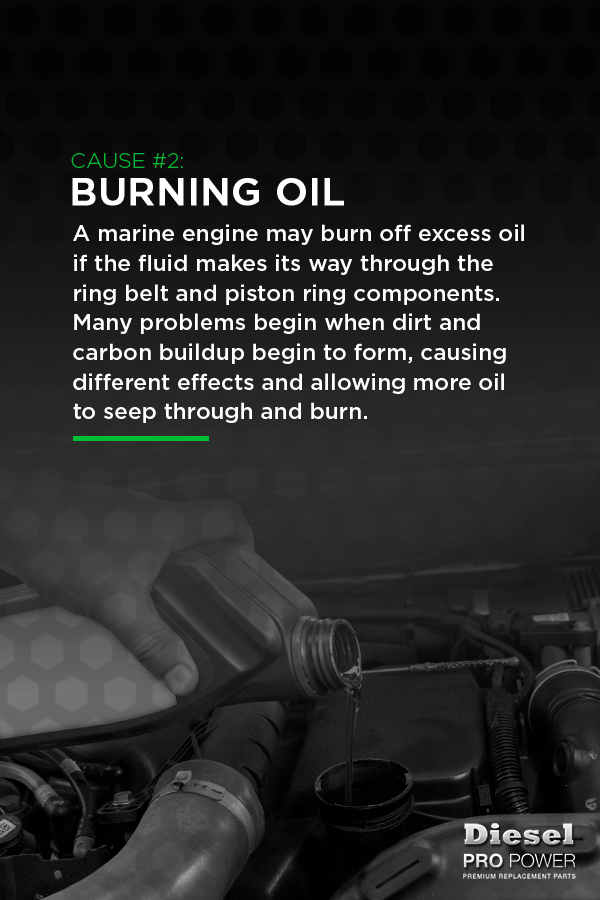
Using high-quality oil can prevent deposits and help avoid burning. It can also help keep the ring belt and piston ring sections clean.
Ways oil can leak into the engine’s combustion chamber include:
– Clogged bearings
– Damaged pistons, liners and piston rings
– Incorrect installation of intermediate rings
– Seal ring leaks in the turboshaft
– Worn valve stems and guides
Smoke coming from the exhaust is often a sign of burnt oil in an engine’s combustion chamber as a result of worn components. The causes of burning oil include:
Poor Quality Oil
Using incorrect, old or dirty oil can cause an increase in fluid consumption. If you replace the original oil with a cheaper and less effective brand, it can influence the entire system. If you don’t stick to a maintenance schedule or the oil is contaminated, it won’t be able to lubricate the engine properly.
Select the proper oil for your marine engine and check to see if the oil is full of debris. It may appear dark brown or black. You can also look for carbon deposits that affect the efficiency of lubrication. If the quality of the oil is poor, the components will consume more fluid, and parts like the cylinders, bearings, pistons, and piston rings will experience excessive wear.
Carbon buildup and contamination decrease the fuel quality, alter the commercial engine’s compression and diminish the oil’s life. Make sure to stick to a regular schedule of changing your engine’s oil and oil filter.
High Levels of Oil Pressure
High oil pressure will cause the fluid to flood a marine diesel engine. An overflow can be the result of adding too much oil, a faulty relief valve or a problem with your boat’s central computer system. High oil pressure can also be the result of your crankcase being clogged with dirt. A buildup of debris will cause the seals and gaskets to crack or leak. With too much oil pressure, the fluid will burn off in the cylinders.
Higher Engine Vacuum
Many newer engines on the market have a greater vacuum force because of internal factors that have upgraded, such as the valve overlap and RPM. The increase in power calls for an oil ring to seal the top and bottom of the ring grooves to keep the fluid from passing when the engine is in high vacuum or deceleration. The vacuum can cause excessive oil consumption and smoking.
To combat the problem, use a side sealing piston ring.
Worn Piston Rings
Oil can enter into the combustion chamber if the piston rings are worn. Old rings don’t have the right tension and clearances, causing the hot gases and oil to pass through without being maintained. As the oil burns inside the chamber, carbon deposits form on the cylinders, rings and pistons.
Broken piston rings are even more damaging to the system because they can cut the piston grooves, resulting in land breakage and destroying the entire piston assembly. You may notice a decrease in compression when your piston rings are faulty.
Make sure to replace the piston rings when necessary.
Piston Rings That Lose Mobility
If the piston rings get stuck in the piston grooves, they can do little to manage the amount of oil that enters the cylinder. An immobile ring will cause the scraper ring to increase pumping and cause excessive oil consumption. From there, the oil will burn. It can cause a loss in power as well as a weakened throttle response in your marine engine.
Install clean rings to prevent them from sticking and ensure there is enough side clearance available.
Insufficient Piston Ring End Clearance
The end clearance of a piston ring experiences direct exposure to higher temperatures during the combustion process — more so than the cylinder. If the piston ring doesn’t receive enough end clearance, it will ride against the other piston ring while the marine engine is operating. Constant contact can result in scored and scuffed rings, causing an increase in oil consumption.
Damage to the end clearance can increase in severity if you’re hauling a heavy load. The piston rings can get bent inward, forming a space between the cylinder and rings. As a result, the oil and gases leak through and burn at high rates. Use a set of piston rings with the correct end clearance to avoid any problems.
When your Detroit Diesel or Cummins engine is experiencing oil leaks and burning, you can fix and further prevent excessive consumption by paying attention to your operations. Also, use quality oil that’s recommended by the manufacturer. Fix any leaks and replace worn parts to keep your engine healthy.
Knowing how to fix excessive engine oil consumption comes down to finding the problem and working with the right dealer for superior solutions.
The Impact of Poor Oil Consumption
The effects of excessive oil consumption can negatively affect your marine engine in various ways, including the following:
– The entire system undergoes additional stress.
– The oil left in the engine also experiences tension.
– The engine will consume additives faster and reduce the oil’s life.
– Burnt oil can form carbon deposits on the combustion chamber valves.
– When the fluid reaches the inside of the chamber, it can create carbon deposits on the pistons.
– Carbon buildup reduces airflow to the cylinder, resulting in power loss and poor engine performance.
The consequences of letting your engine guzzle up oil are extensive and may require expensive repairs. If left untreated, high oil consumption can lead to component failure, unnecessary topping up and the potential of a complete engine overhaul.
Ensure Optimal Use of Your Marine Engine With the Right Parts
Diesel Pro Power provides all the parts you need to combat your diesel engine’s excessive oil consumption through our convenient online store. We offer worldwide shipping, and our excellent customer care team works to build a personal connection with you to understand your situation better. We can help diagnose your oil consumption problem and suggest the appropriate solutions.
Browse our parts for Cummins, Detroit Diesel, Twin Disc and Allison Marine engines. You can also reach out to us online or speak with a Diesel Pro Power representative by calling 1-888-433-4735.



 Free US Calls: 1-888-433-4735
Free US Calls: 1-888-433-4735 International: 305-545-5588
International: 305-545-5588
